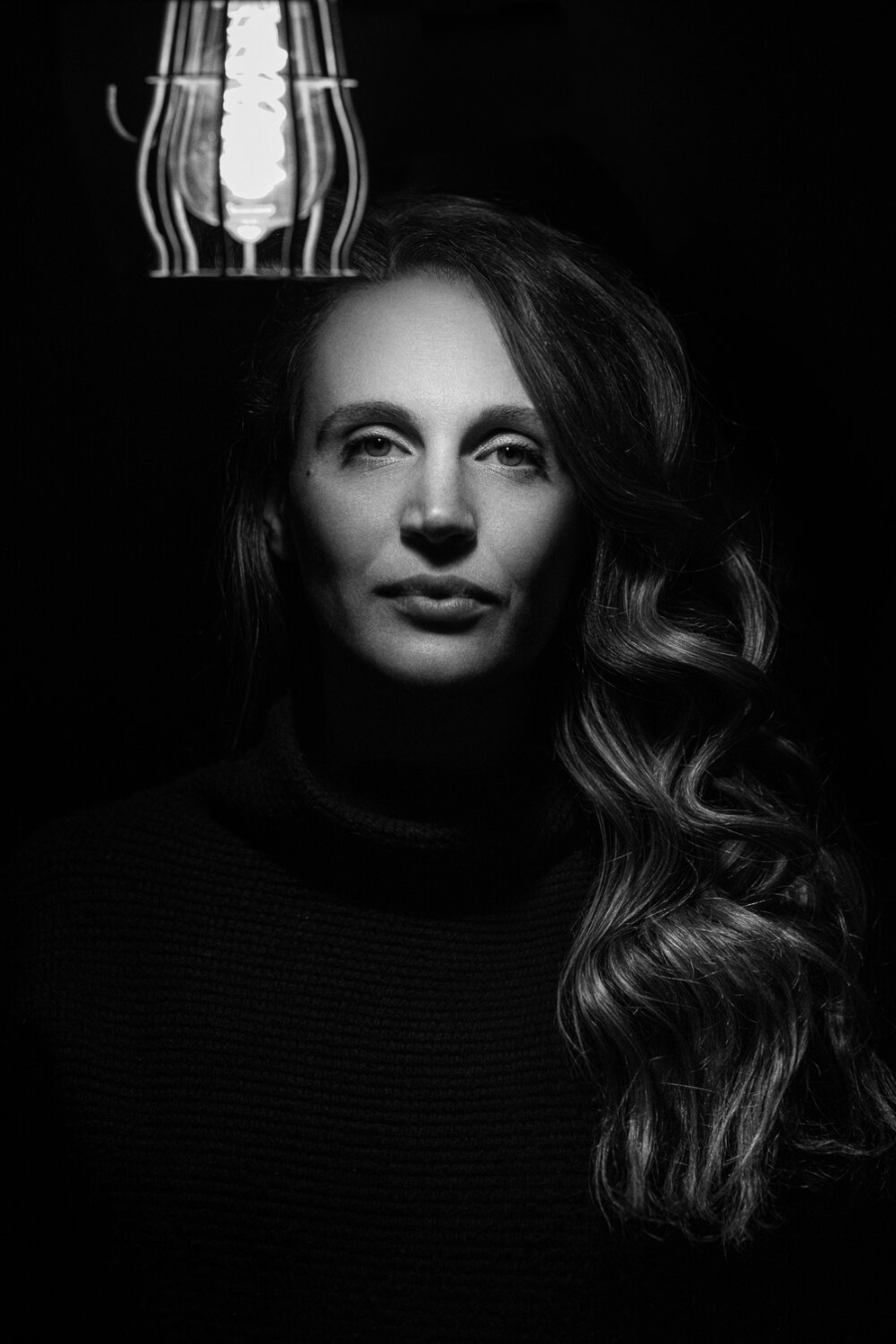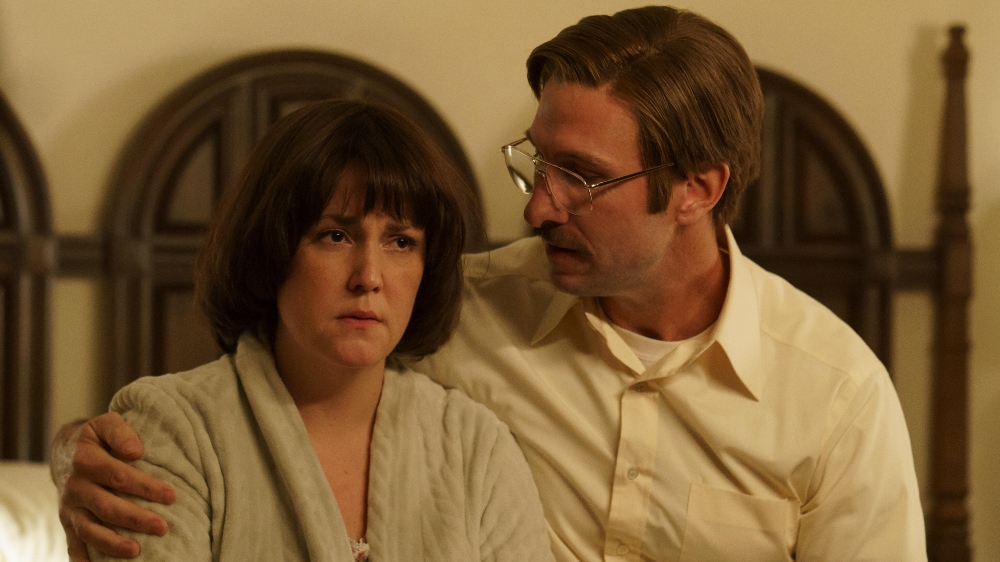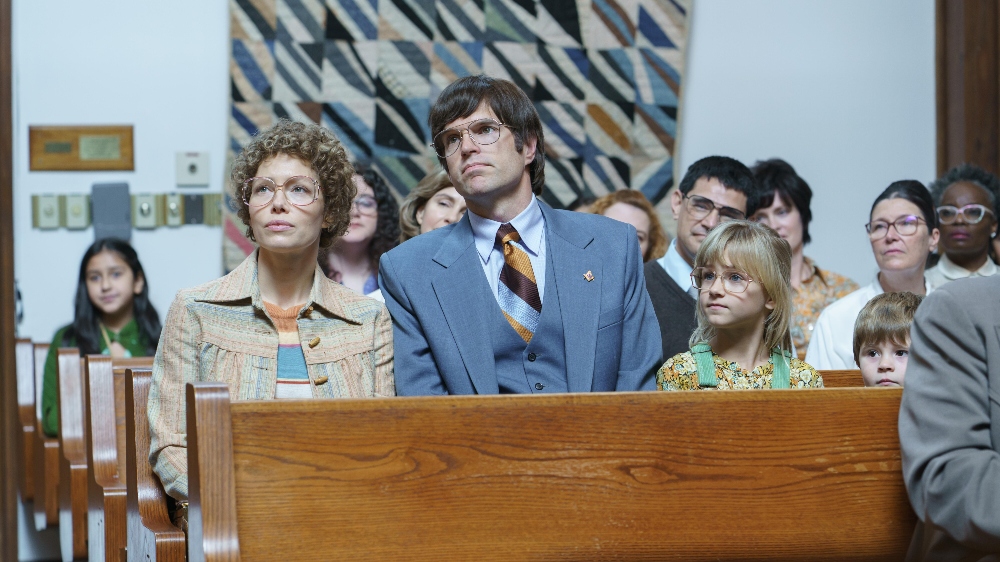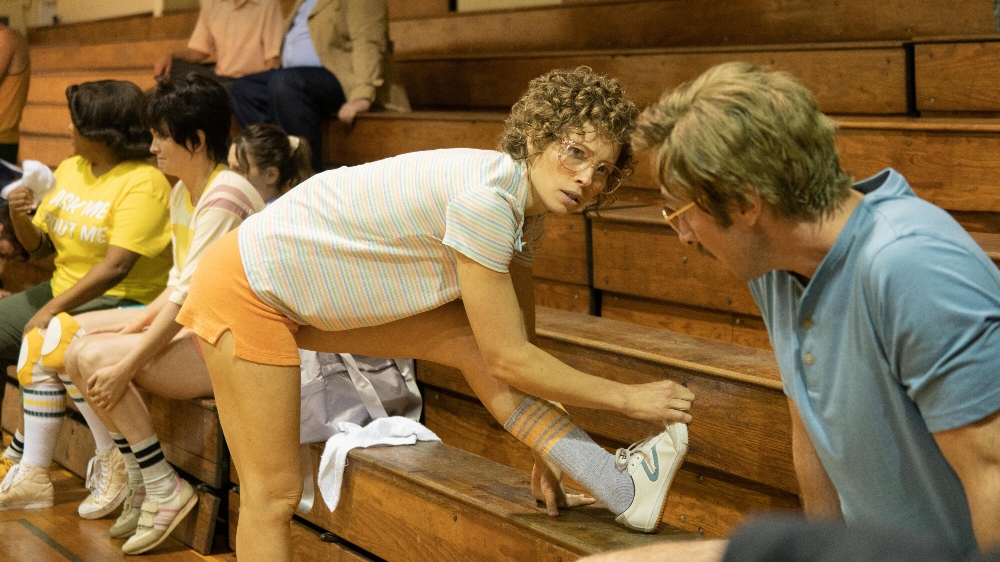
It was Friday, June 13, 1980, when Candy Montgomery, a bible-belting bored housewife hacked her neighbor, Betty Gore, to death with an ax. The shocking crime shook the tight-knit community of Wylie, Texas, and led to a murder trial that saw Montgomery claim self-defense. More than 40 years later, the events that led up to that fateful day have been dramatized in Hulu’s new limited series Candy, which the streamer rolled out as a five-day event that culminated on Friday, May 13, which no doubt served the marketing campaign well.
The series, which stars Jessica Biel as Candy and Melanie Lynskey as Betty, was co-created by Robin Veith and Nick Antosca, and it features a foreboding and purposeful score from composer Ariel Marx, who is best known for combining orchestral and rare instruments with electronics. She was brought in to create the musical backdrop for the dark, macabre moments strewn about Candy, as well as the light, playful ones. Her credits include the acclaimed indie comedy Shiva Baby, the Netflix series My Love, “Drive-In” of American Horror Stories, and Amazon’s Ted Bundy: Falling For A Killer.
Below The Line spoke with Marx, ironically, on Friday the 13th via Zoom from her home in Los Angeles, where she talked about how the music of Candy was intended to reflect both the contrast and balance between the mundane, everyday lives of the characters and the horror of what happened. She also discussed her intention behind using a repetitive singular melody in the main “Candy” theme, and what instruments she used to further illustrate the range of emotions that cascade through the series, from smoldering anger to the sadness befitting an innocent life taken far too soon.

Below The Line: How did you initially get involved with this project?
Ariel Marx: My agent got an inquiry from the creators, Robin Veith and Nick Antosca, and [executive producer] Alex Hedlund. I had a meeting with them and it went fantastically, and [I] started writing music in pre-production It all happened really quickly and wonderfully.
BTL: What was discussed in those initial conversations about the score?
Marx: I worked mainly with Robin and Mike [Uppendahl], who directed the first episodes, on the minutiae of every cue. They had sent me the pilot script and it’s brilliantly written and so detailed, and so much of the tone was communicated already in the script. There was so much subtext that you see on the screen [that] was written. The first conversations were definitely about the tone of the show. While it was going to be dark and it was going to be poignant and sad, there were also a lot of moments of fun. It was a day in the life of these women, but also, [about someone] seeking pleasure, satisfaction. It was this huge spectrum of emotion that the score would be digging into and not just about the darkness. That was very exciting to me.
BTL: How would you describe how you approached the score with that in mind?
Marx: Writing the score was this flirtation with melody and having a sense of unfulfilled potential. There was a phrase in the script called “oppressive sameness” and that really influenced how I started writing the score as well, especially the most melodic cues.

BTL: What influenced the “Main Title” cue which repeats throughout?
Marx: It is this idea of repetition where the melody is very, very simple. It’s a quick succession of a bunch of single notes on the piano, which creates the melody. The fact that they’re not on the grid to a click and kind of off-kilter and not necessarily landing on the direct downbeat was very intentional. It kind of has a sense of violence to it but it also is contextualized in a very lush, gauzy orchestration around it. That’s the “Candy” theme and it was actually the first thing that I wrote for the show. It shows up in all sorts of places and all sorts of iterations. There are some where it’s pure [and] in its happiest form, and there are some where it’s couched in a much darker web of other sounds. It was tracing Candy’s ability to keep it together on the outside, it’s tracing her denial of and her desire for a satisfying life. It’s also coming up in moments of violence and darkness, which is a trace of her in a scene that she isn’t in. It’s used in all sorts of ways, which was very intentional.
BTL: What instruments did you use to create the score?
Marx: It was larger orchestral textures, kind of more intimate, violent strings, and then woodwinds and synths. There are strings, and I worked with a fantastic woodwind player, Josh Plotner, and he’s playing the sweetness of the flute lines underneath the darker textures. That was a contrast which I really loved. There are a lot of synths to be played with, and a larger orchestral ensemble with sample libraries.

BTL: Do you have a signature riff?
Marx: Candy is kind of a perfect illustration in that I love writing in the melodic world and making a feast out of texture. That’s such an interesting question. I do very well, and love and enjoy, the simple texture made very complex by a very detailed approach, but I also love to be able to swim in the large melodies and orchestral arrangements. I would say my signature would be combining those two worlds.
BTL: Your background with synth music mixed with orchestral instruments really fit this series.
Marx: I think the creators and the showrunners were drawn to my work for Shiva Baby. Some of that very raw string work is something that I love doing. That aesthetic is definitely woven into Candy but it’s in a much dreamier, hypnotic kind of context and is often in contrast to melodic and seemingly safe arrangements. It was really interesting to kind of emulate a sense of forward-facing safety and happiness and then behind the surface, a kind of simmering rage.
BTL: You almost had your Psycho moment there in the shower scene with the strings.
Marx: [laughs] Yeah, I mean, I do my own version of that. In the very beginning, we talked about a few score references, which were a combination of Twin Peaks, Blade Runner, and Eyes Wide Shut, but ultimately, we didn’t quite go in that direction. Some of them still stand with a sense of heightened reality, [a] sense of simplicity, and the sense of melody. Palette-wise, they’re not direct comps, but in terms of larger directional notes, [they were] valuable in steering me in the direction of my first pass. But then it was its very own voice. It was a huge playground with no rules. I was very much encouraged to be [as] bold as I could and play around with melody and texture.

BTL: What were some of your favorite cues to compose?
Marx: The very first thing I wrote is actually the theme that’s used in the “Main Title.” I literally remember I knew how I was going to write it the next day after hearing it in my head the night before. It was very strong from the get-go, so I loved writing that melody and all of the different iterations [of] it in the show. I really enjoyed this piece for the fight where Candy’s version of the story actually takes place. It was such a guttural, kind of hypnotic, beast-like scene, and I really got to tune into that with the music. It was so instinctual and animalistic and fun. Some of the music for “The Affair” (Candy has an affair with Betty’s husband, played by Pablo Schreiber) was really fun [to write]. It had a sense of romanticism, a sense of danger, a sense of fun but also monotony. These ideas were so rich and wonderful to play within the music.
BTL: What instruments did you use to bring out certain emotions?
Marx: For the violence, it was string and synth-based, which was very guttural and a-tonal. It wasn’t classically articulated, beautiful, flowing lines, but very aggressive. For the affair, it was much more bubbly in the synth world, and then for Candy’s theme and all the iterations, it was much more orchestral and dreamy and hypnotic with lots of electric piano and strings and woodwinds. For the synths, I used a plug-in Zebra and some Sound-Dust synths with some back-end manipulation of those sounds. “The Affair” cues are very bubbly and percussive, and sometimes light and sparkly. For the darker cues, they were very guttural and dis-forwarded and bassy and stubby. I also used acoustic instruments to emulate patterns of synths in arpeggios and certain percussive ways.

BTL: [SPOILER WARNING] Did it occur to you that you were reuniting with Jason Ritter after composing The Tale?
Marx: He was a surprise guest. I didn’t know that Justin [Timberlake] or Jason were gonna be in the show. I think they were deliberately kept a surprise. It was fun that they were partners of the women (Biel and Lynskey) who are the leads. It was totally a delight to see Jason again. I have to say, the performances are absolutely stunning in this show. I think everyone does such a deeply compassionate and honest job. I had read the script that was so vivid and lively in its own form, and then to see it come to life in such an amazing way, from the direction to the set design, to the boldness of the cinematography… when I finally got my hands on it [and added] music, it was just such a delight to work on.
BTL: When you watch the series, how do you feel your music best conveyed the action on the screen?
Marx: I watched it in a couple of settings, during our mixes and along through the process, [and] I saw the pilot screening at a smaller theater. Watching it at the premiere (at the El Capitan Theatre in Los Angeles), I just got so swept up in the reaction of it from the audience and the largeness of the screen. It was just a joyous experience. I feel really proud of how the world was established in terms of this idea of domestic bliss, and how repressed elements of rage and boredom and loneliness slipped their way into this perfect facade. I think it was illustrated the best I could in the main titles and the main melodic themes. The stories I’m often approached for are very emotionally complex and have nuance, so the music has to shapeshift in a cohesive way, which I enjoy the most.
Candy is currently streaming in its entirety on Hulu.





